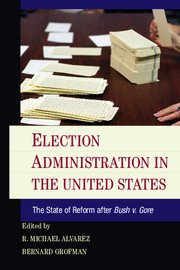Book contents
- Frontmatter
- Contents
- List of Contributors
- Foreword
- Acknowledgments
- Editors’ Introduction
- Part I Bush v. Gore in Perspective
- 1 Disputed Elections Post Bush v. Gore
- 2 The Cites that Counted
- 3 Bush v. Gore in the American Mind
- Part II What Has Changed since Bush v. Gore?
- Part III Remaining Challenges
- References
- Index
1 - Disputed Elections Post Bush v. Gore
Published online by Cambridge University Press: 05 October 2014
- Frontmatter
- Contents
- List of Contributors
- Foreword
- Acknowledgments
- Editors’ Introduction
- Part I Bush v. Gore in Perspective
- 1 Disputed Elections Post Bush v. Gore
- 2 The Cites that Counted
- 3 Bush v. Gore in the American Mind
- Part II What Has Changed since Bush v. Gore?
- Part III Remaining Challenges
- References
- Index
Summary
Introduction
The two most vital qualities of any voting system are simple to identify: (1) the winner wins – that is, the candidate with the most lawful votes is elected; and (2) the loser and his or her “reasonable” supporters believe they have lost. All other considerations are secondary.
This chapter provides a broad overview of U.S. practices for the resolution of disputed elections and inventories types of election disputes. Then it examines in some detail four election disputes that took place after the Bush v. Gore decision. Three of the disputes are studied because they arguably are the most widely followed and extensively contested election results since 2000: Washington gubernatorial (2004), Minnesota Senate (2008), and Florida Thirteenth Congressional District (2006). The final dispute, an Ohio Common Pleas Court Juvenile Judge contest, is examined because, as of early 2011, it was the only significant decision using Bush v. Gore as precedential authority in an election contest or recount.
- Type
- Chapter
- Information
- Election Administration in the United StatesThe State of Reform after Bush v. Gore, pp. 3 - 31Publisher: Cambridge University PressPrint publication year: 2014



